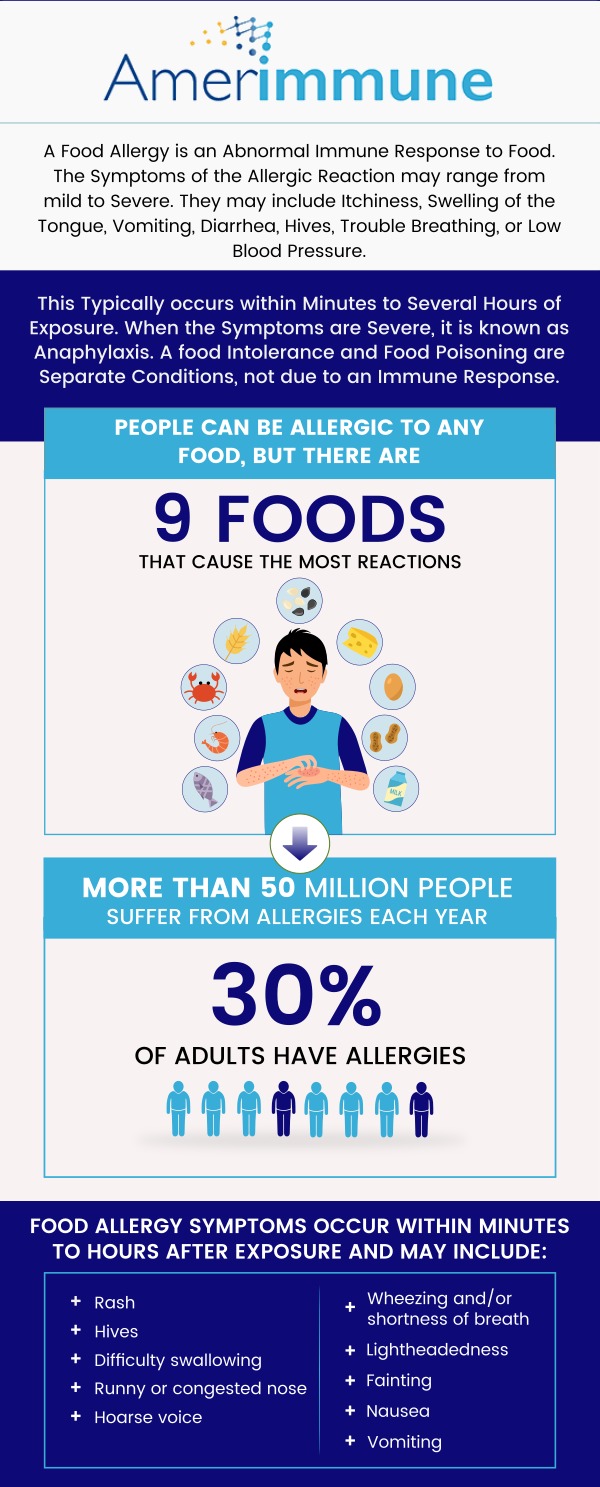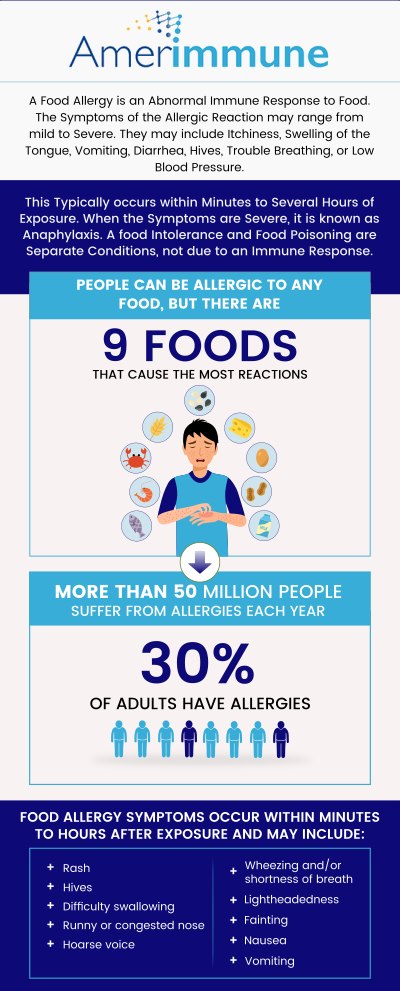Why Is It Necessary to See an Allergist If You Suspect a Food Allergy?
If you suspect a food allergy, consulting an allergist is crucial for an accurate diagnosis and a safe management plan. Unlike a simple intolerance, a true food allergy can trigger a severe, life-threatening reaction. Dr. Oral Alpan, MD, can conduct specific tests to identify the exact allergen, distinguishing a real allergy from other sensitivities, and equip you with the knowledge to safely avoid triggers and manage any potential emergencies. For more information, contact us or appointment online. We have convenient locations in McLean VA, Alexandria VA, Arlington VA, Bethesda MD, and Gaithersburg MD.


Table of Contents:
How can an allergist help diagnose a food allergy?
What tests will an allergist conduct to confirm a food allergy?
Why shouldn’t I self-diagnose a food allergy without seeing an allergist?
How can an allergist help prevent potential severe reactions to food allergies?
When you visit Amerimmune Clinic, our specialists will conduct a thorough evaluation, beginning with a detailed medical history and physical examination. We’ll discuss your symptoms—including their timing, severity, and any suspected food triggers—as well as your family history of allergies and any previous reactions you may have experienced.
Based on this assessment, our team may recommend specialized diagnostic tests. These can include skin prick testing, where small amounts of suspected food allergens are applied to the skin to observe for a reaction, and blood tests to detect specific IgE antibodies linked to food allergies. In select cases, we may suggest a medically supervised oral food challenge—considered the standard for food allergy diagnosis—where you’ll consume small, gradually increasing amounts of the suspected food under close observation in our clinic.
Our allergists interpret all test results in the context of your unique medical history and symptoms, as test results alone are not always definitive. Through this comprehensive and individualized approach, we can determine whether you have a true food allergy and develop a clear management plan to help you avoid allergic reactions and live with confidence.
If you suspect you may have a food allergy, the experienced team at Amerimmune Clinic is here to support you every step of the way.
When you visit Amerimmune Clinic for evaluation of a possible food allergy, your journey begins with a comprehensive medical history taken by our experienced providers. We take the time to carefully discuss your symptoms, the timing and frequency of your reactions, the specific foods involved, and any family history of allergies or immune-related conditions. This detailed approach allows us to tailor your evaluation and care to your unique needs.
Based on your history, your clinician may recommend skin prick testing. During this procedure, small amounts of diluted food extracts are applied to your skin—usually on your forearm or back—and the skin is gently pricked. After about 15 to 20 minutes, we check for localized reactions such as redness or swelling, which can indicate an allergic response. Our clinic uses state-of-the-art techniques to ensure accurate and comfortable testing.
We may also utilize advanced, specific IgE blood tests to measure the amount of IgE antibodies your body produces in response to particular foods. While elevated levels of specific IgE may suggest a food allergy, our specialists interpret these results within the context of your history and other findings to avoid misdiagnosis.
In certain cases, your Amerimmune provider might recommend an oral food challenge—the gold standard for diagnosing food allergies. This test is done under the close supervision of our medical team in a controlled environment, where you will consume gradually increasing amounts of the suspected food allergen. We closely monitor for any reactions, ensuring your safety throughout the process.
Additionally, we may advise keeping a food diary or following an elimination diet, where you temporarily avoid certain foods and then reintroduce them one at a time. These approaches can provide valuable information, particularly when other tests are inconclusive.
At Amerimmune Clinic, our goal is to provide you with an accurate diagnosis and individualized management plan. Our team will guide you in safely navigating food allergies, minimizing risk, and improving your quality of life.
At Amerimmune Clinic, we understand how confusing and concerning food-related symptoms can be. While it might be tempting to self-diagnose a food allergy, doing so without expert input can be risky and misleading. Food allergies are complex conditions that often mimic other health issues, such as food intolerances or gastrointestinal disorders. Without a thorough evaluation from specialists, it’s easy to misinterpret symptoms and mistakenly blame certain foods.
This can lead to unnecessary dietary restrictions, which may cause nutritional deficiencies and impact your overall well-being. Our medical team uses a comprehensive approach—including detailed medical history, physical examination, and advanced diagnostic testing—to accurately determine whether you have a food allergy, identify the specific triggers, and assess the severity of your condition.
Over-the-counter tests and self-assessment tools are often unreliable, producing false positives or negatives that complicate your health decisions. By relying on Amerimmune Clinic’s expertise, you avoid unnecessary anxiety, prevent unwarranted food eliminations, and ensure that any underlying conditions are properly identified.
Allergists play a pivotal role in helping patients prevent and manage severe reactions to food allergies. Leveraging advanced diagnostic tools and a wealth of specialized knowledge, our clinicians accurately identify the foods that trigger allergic responses. This process often includes a thorough medical history, state-of-the-art skin prick testing, and precise blood tests to measure allergy-specific antibodies—all available right here at Amerimmune Clinic.
Once the offending foods are identified, our team provides personalized guidance to help patients avoid exposure. We empower our patients and their families with practical skills, such as interpreting ingredient labels, detecting hidden sources of allergens, and making safe choices when eating out or traveling.
Our Clinic also offers the latest in allergy treatments, including oral immunotherapy for select patients. Under close medical supervision, this innovative approach can help build tolerance to specific allergens, opening new possibilities for those living with food allergies.
With ongoing support, regular follow-up visits, and access to the latest advances in allergy management, the Amerimmune Clinic team is dedicated to reducing the risk of severe reactions and empowering our patients to live freely and safely. For more information, contact us or appointment online. We have convenient locations to serve you. We serve patients from McLean VA, Alexandria VA, Arlington VA, Bethesda MD, Gaithersburg MD, Vienna VA, IdylWood VA, Lincolnia VA, Groveton VA, Falls Church VA, North Bethesda MD, Takoma Park MD, Montgomery Village MD, Redland MD, Aspen Hill MD, and surrounding areas.

Additional Services You May Need
▸ Allergy Consultation
▸ Immunology Consultation
▸ Allergen Immunotherapy
▸ Allergy Vials
▸ Allergy Shots
▸ Biological Drug Administration
▸ Diagnostic Testing
▸ Skin Prick Testing
▸ Allergy Patch Testing
▸ Oral Food Challenge Testing
▸ Nasal Swab Culture Testing
▸ Phlebotomy
▸ Telehealth
▸ Immunology Testing
▸ Food Allergy Testing
▸ Asthma

Additional Services You May Need
▸ Allergy Consultation
▸ Immunology Consultation
▸ Allergen Immunotherapy
▸ Allergy Vials
▸ Allergy Shots
▸ Biological Drug Administration
▸ Diagnostic Testing
▸ Skin Prick Testing
▸ Allergy Patch Testing
▸ Oral Food Challenge Testing
▸ Nasal Swab Culture Testing
▸ Phlebotomy
▸ Telehealth
▸ Immunology Testing
▸ Food Allergy Testing
▸ Asthma

